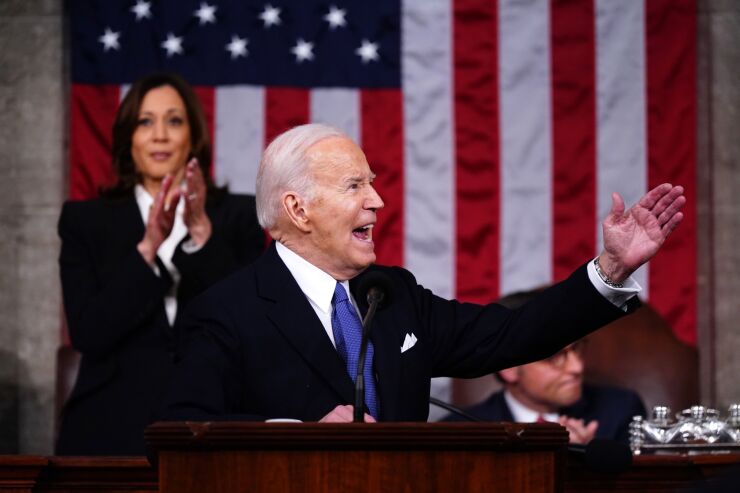President Biden reignited the tax debate in his State of the Union address Wednesday, touting the progress he’s made so far in his three years in office and the amount of work still needed to be done on taxes, setting up a larger partisan battle for the coming year.
“The way to make the tax code fair is to make big corporations and the very wealthy begin to pay their fair share,” Biden said. “Thanks to the law I wrote and signed, big companies now have to pay a minimum of 15%. But that’s still less than working people pay in federal taxes.”
“It’s time to raise the corporate minimum tax to at least 21% so every big corporation finally begins to pay their fair share,” Biden said, adding he’d like the raise the corporate tax rate to 28% from its current 21%, establish a minimum 25% tax on individuals with wealth over $100 million and increase the Medicare tax rate on income above $400,000.
Biden also hopes to expand the Earned Income Tax Credit, and restore the Child Tax Credit, which expired at the end of 2021. That’s all ahead of the Trump era Tax Cuts and Jobs Act expiring at the end of 2025.
“Do you really think the wealthy, big corporations need another $2 trillion tax break?,” Biden said, referring to the expiring act. But the upcoming tax debate also gives the muni industry a clear opportunity for including their long held priorities, such as the restoration of advance refundings, raising the bank-qualified debt limit and expanding the use of PABs, in any upcoming package.
“The president laid out key Democrat parameters for the tax debates, setting the stage for the debate even if he does not win reelection later this year,” Bond Dealers of America said in a statement. “BDA is planning regular fly-ins over the next 18 months to promote the tax exemption, and advocate key muni priorities in the context of tax reform.”
The president also touched on the gains made from the Bipartisan Infrastructure Law, while chastising some of his Republican opponents who once stood in his way.
“And thanks to our bipartisan infrastructure law, 46,000 new projects have been announced all across communities. And by the way, I notice some of you strongly voted against it are there cheering on that money coming on. I’m with you. I’m with you. If any of you don’t want that money in your district, just let me know,” President Biden said, citing a list of his infrastructure priorities.
“Modernize our roads and bridges, ports and airports, public transit systems. Removing poisonous lead pipes so every child can drink clean water without risk of brain damage. Providing affordable high-speed internet for every American no matter where you live: urban, suburban or rural communities—in red states and blue states. Record investments in tribal communities.”
The BIL has so far distributed over $2.62 billion to state DOTs, agencies, railroads, airports and ports. State governments and federal lawmakers are
“Although the president talked about the success of the Infrastructure and Jobs Act, the fact remains that too much of the money provided in the bill is not getting to our states and communities because of the federal bureaucracy, convoluted and confusing grant processes, and the Administration’s prioritization of climate, equity and environmental justice over effective improvements to the Nation’s infrastructure and network supply chain,” House Transportation and Infrastructure Committee Chairman Sam Graves, R-Mo., said in a statement.
“I urge the president and Democratic leadership to work with Republicans to move our various initiatives to streamline energy and infrastructure projects,” Graves added, citing the Lower Energy Costs Act as well as the Committee’s Creating Confidence in Clean Water Permitting Act.
But aside from the clear line the president hopes to draw between him and his predecessor before November’s rematch, there was much more touting his current accomplishments than the announcement of new ones.
“My policies have attracted $650 billion of private sector investments in clean energy and advanced manufacturing creating tens of thousands of jobs,” he said. “I’m taking the most significant action ever on climate in the history of the world,” Biden said. “I am cutting our carbon emissions in half by 2030. Creating tens of thousands of clean-energy jobs, like the I.B.E.W workers building and installing electric vehicle charging stations. Conserving 30% of America’s lands and waters by 2030.”
